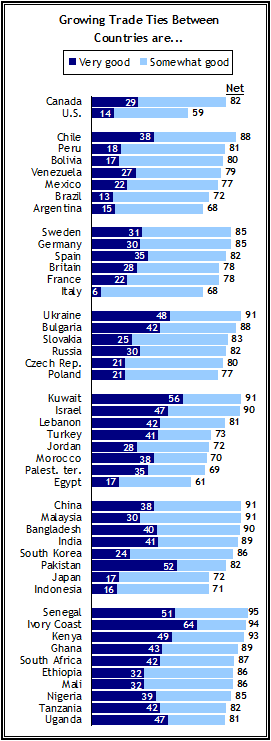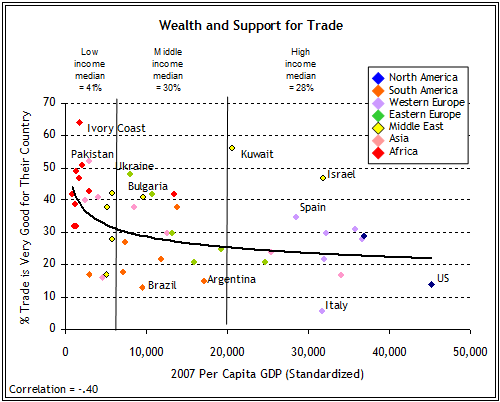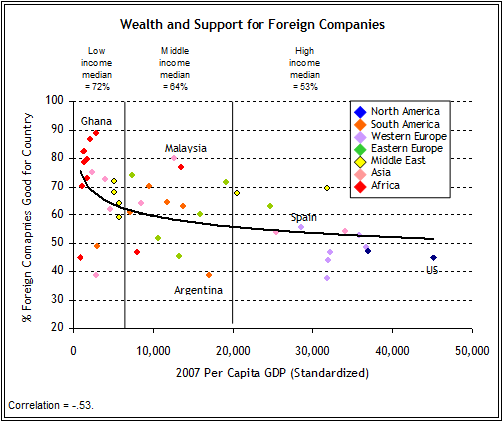
Overall, many publics are somewhat more satisfied with the state of their countries than they were five years ago. In the 35 nations where trends are available, the number of people satisfied has increased in 21, declined in nine, and remained basically unchanged in five.
The greatest improvement is found in Bangladesh, where 75% currently say they are satisfied with the direction of their country, compared with 20% in 2002. Five years ago, only 8% of Kenyans were pleased with the way things were headed; today, 45% say they are satisfied. Other large improvements have taken place in a diverse set of countries: Argentina, India, Slovakia, Jordan, Turkey and China.
In some countries, however, assessments have grown more negative. Five years ago, only 24% of Italians said things were going well in their countries, but in the current poll the number is even lower – 16% now are satisfied with the country’s course. Satisfaction has also dropped significantly in Canada, Pakistan, France, the Czech Republic and Uganda. Still, the country where discontent has grown the most is the United States. In 2002, 41% were satisfied with the country’s direction, while today only 25% are satisfied. Democrats (16% satisfied) are particularly displeased, although even among Republicans, just 39% believe things in the country are headed in the right direction.
Satisfaction with the state of the country is generally associated with rising economic growth. Countries such as Argentina, Venezuela, Slovakia, India, China and Turkey that have enjoyed large increases in GDP per capita since 2002 also tend to have had the largest gains in country satisfaction.
Despite the increased satisfaction in many countries over the last five years, global publics largely remain unhappy with the direction of their countries. Majorities in only eight of 47 nations say they are satisfied with the way things are going in their countries today. Across the world, however, there are enormous differences. The top three most satisfied publics are all in Asia – China (83%), Malaysia (76%) and Bangladesh (75%). Conversely, in five nations the percentage of people satisfied with the current situation is in single digits – Bulgaria (9%), Ukraine (9%), South Korea (9%), Lebanon (6%) and the Palestinian territories (5%).
While the Lebanese and Palestinians are extremely unhappy with the way things are going in their countries, elsewhere in the Middle East assessments are more upbeat. Most Moroccans, Jordanians, and Kuwaitis, along with nearly half of Egyptians, believe their countries are on the right track.
In other regions, views are largely negative. No country in Latin America, Eastern Europe, or Africa has a majority that is satisfied with the state of their country.
National Economic Situations Improving

Across all regions of the globe, economic evaluations have improved over the last five years. In 28 of 35 countries where trends are available, the number of people who believe their country’s economy is in good shape has increased significantly since 2002. This positive shift is particularly striking in Latin America. Publics in every country in the region where trends are available have grown more positive about the economy. Only 1% of Argentines felt the economy was strong in 2002, compared to 45% today. In Bolivia, confidence in the economy has more than tripled, jumping from 18% to 58%. The shift has been almost as dramatic in Venezuela (21% in 2002, 57% now), which has benefited from rising oil prices in recent years.
Perceptions have also grown more positive in Eastern Europe, although most in the region remain glum about their economic situations. The most impressive turnaround has occurred in Slovakia – 53% give their nation’s economy positive marks, compared with just 7% in 2002.
Other nations have also become more upbeat, including India (+35) and China (+30), two emerging Asian economic powers. The Turks (+32) also feel much more positive about their economy than in 2002. And the greatest increase on the survey occurs in Kenya, where positive assessments of the economy have risen a stunning 53 percentage points in the last five years.
Once more, the most striking changes on this measure have taken place in middle income countries, where the median change in the percentage of people saying the national economy is good has risen 29 points since 2002. Slovakia (+46), Argentina (+44), and Turkey (+32) – all of which have experienced impressive economic growth in recent years – have seen especially large increases.

There has been less change in lower income nations, although economic assessments have grown considerably more positive in several countries, particularly Kenya, Bolivia, and India. Meanwhile, trends vary in the high income category. Despite relatively anemic growth over the last five years, Germans have become dramatically more upbeat about their country’s economy (+36). Positive evaluations are also up significantly in Japan (+22). However, in France, Italy, and South Korea, assessments have grown considerably more negative since 2002.
Support for International Trade

In all 47 nations included in the survey, large majorities say international trade is a good thing for their countries. In nine countries, at least 90% of respondents support international trade. Positive views of trade are particularly widespread in Africa, the world’s poorest region. More than eight-in-ten people in the 10 African nations surveyed believe that trade ties are having a positive impact.
Some publics have become more receptive to trade in recent years. In 2002, Jordanians were particularly skeptical of its benefits, with just 52% saying trade with other countries was good for Jordan. In the current survey, 72% of Jordanians express that view. Positive views of international trade also have increased in Argentina, though less dramatically (60% in 2002, 68% currently).
Overall, however, views about trade have grown somewhat more negative in nearly half of the 35 countries that were surveyed in both 2002 and 2007. In 14 countries, the proportion expressing positive opinions of foreign trade has declined substantially. By contrast, positive opinions of trade have increased in just four countries, and has held fairly steady in 17 countries.
Notable declines are particularly common in the advanced economies of the West. Although support for trade remains high in Western Europe, enthusiasm has diminished in Italy (80% said trade was good in 2002, 68% now), France (88% in 2002, 78% now), Britain (87% in 2002, 78% now), and Germany (91% in 2002, 85% now).

However, the largest decline among the 35 countries for which comparative data are available has taken place in the United States. The country with the world’s largest economy is the least likely among surveyed countries to embrace global trade. Just 59% of Americans say trade with other countries is having a good effect on the U.S., down sharply from 2002, when 78% believed it was having a positive impact.
The American public’s views vary by age, income and party identification. Roughly eight-in-ten (78%) of those younger than 30, and 58% of those ages 30 to 49, believe that trade has a positive impact on the United States. By comparison, people ages 50 and older are more divided (51% good, 43% bad). Wealthier Americans also are more likely than poorer people to support international trade; two-thirds (67%) of those with household incomes of $75,000 or more think it has a good impact, compared with only 53% of those with incomes below $30,000.
In addition, Democrats are less likely than Republicans or independents to feel trade is having a good effect on the U.S. Democratic attitudes toward trade have soured tremendously over the last five years: in 2002, 77% said trade was having a positive impact, compared with just 53% today.
The chart below highlights the extent to which intensity of support for trade is particularly strong in low income nations, where the median percentage saying trade is very good for their country is 41%. In Ivory Coast, Pakistan, and Senegal, for instance, more than half of those surveyed believe trade is having a very positive impact on their countries.

Enthusiasm for trade, while still high, is slightly more muted in the rapidly growing middle income countries, as well as among the wealthiest nations included on the survey. In both of these categories, there are significant variations among countries. Enthusiasm for trade is widespread in Ukraine and Bulgaria, but lower in Brazil and Argentina. Similarly, Kuwait and Israel show strong support for trade, while the Italian and American publics are more lukewarm.
Positive Views of Multinational Corporations

In addition to having positive views about international trade, the surveyed publics also have generally favorable views of multinational corporations. In 41 of 47 countries surveyed, majorities or pluralities say that foreign companies are having a good impact on their countries. However, opinions of multinationals in the West have declined since 2002.
Overall, Western Europeans take a relatively skeptical view of companies from other countries. Among 47 nations surveyed, France is the only country where a majority says that foreign corporations are having a negative effect. In 2002, the French were slightly more likely to take a positive view of foreign companies (50% good, 45% bad), but today a solid majority believes they are having a negative impact (44% good, 55% bad). Positive views of foreign corporations also have declined by 13 percentage points in Italy, 12 points in Great Britain, and by 10 points in Germany.
Canadians also have lost some of their enthusiasm for foreign companies. Five years ago, 55% of Canadians said they were having a good impact on Canada; today, fewer than half (48%) express this view. In the United States, 50% now see foreign companies as having a positive impact, compared with 45% in 2002.
As with views on international trade, citizens in poor countries tend to have the most positive opinions of multinational corporations (in low income countries the median = 72% good for country). Support for foreign companies is especially high among the African countries included in the survey, perhaps signaling a desire among these publics for foreign investment. Previously released findings from the 2007 Pew poll revealed that African publics generally welcome the involvement in their countries of China and the United States, two major powers with increasing economic ties to Africa (for more on African opinions regarding the U.S. and China, see “ Global Unease With Major World Powers ,” released June 27, 2007).
Support for foreign companies is somewhat lower in middle income countries (median = 63% good for country). Notably, although they are more favorably disposed toward multinational corporations now than five years ago, Argentines are still among the least likely to embrace these companies. Meanwhile, support for foreign companies is mixed in the economically advanced countries (median = 53% good for country) that are, of course, home to many multinationals.

More Support for Free Markets

Beyond their support for international trade and multinational companies, global publics also generally endorse a key philosophical underpinning of economic globalization – free markets. Among both rich and poor countries, people tend to agree that a capitalist approach makes people better off, even if results in inequalities.
Support for free markets, already widespread, has increased since 2002. Majorities in 39 of 47 countries believe that most people are better off in a free market economy, even though some people may be rich while others are poor. Moreover, in 17 of 35 countries for which comparative data are available, support for free markets has risen substantially, while declining in just five countries.
In particular, support for free markets has increased in Asia, Eastern Europe and Latin America. In Asia, Bangladeshis, Indians, Pakistanis and Japanese have all become more supportive of free markets since 2002. And in China – which is still governed by the Communist Party, although it has greatly liberalized its economy – support for free markets is overwhelming. Three-in-four Chinese say people are better off in free markets, even if that means inequalities in their society.
In the formerly communist nations of Eastern Europe, capitalism receives more mixed reviews. Still, support has risen steeply in Poland, Russia, and Bulgaria, each of which has enjoyed strong economic growth in recent years.
Similarly, in Latin America, views are somewhat mixed, but the trend is clearly in favor of free markets. For example, support remains relatively low in Argentina, but Argentines are significantly more likely to embrace free markets today than in 2002. In Venezuela, home to fiery leftist president Hugo Chavez, 72% endorse a free market approach, up nine percentage points from 2002. Support for free markets also has increased in Brazil and Mexico. (For more on Latin American opinions on this question, see “ Global Opinion Trends 2002-2007: A Rising Tide Lifts Moods in the Developing World ,” released July 24, 2007.)
Africans generally tend to embrace free markets. In the Ivory Coast, Nigeria, Kenya and Mali, more than three-in-four say free markets generally make people better off. Similarly, in economically struggling Middle Eastern nations such as Lebanon and the Palestinian territories, most back a capitalist approach – a view shared in two of the region’s wealthiest countries, Israel and Kuwait.
In other economically advanced nations, belief in free markets also is high, even though several of these nations have recently experienced slow economic growth. For instance, Italians voice strong support the free market, despite anemic growth rates over the last few years. This high degree of confidence in the market is not shared by all wealthy nations, however: in France, 55% say people are better off in free markets, while the Japanese are evenly divided (49% say people are better off in free markets vs. 50% who disagree).




